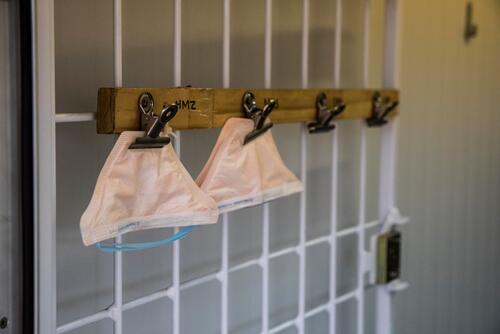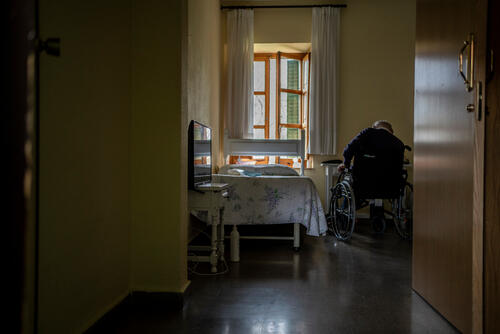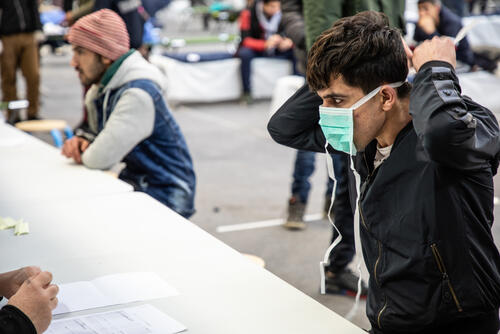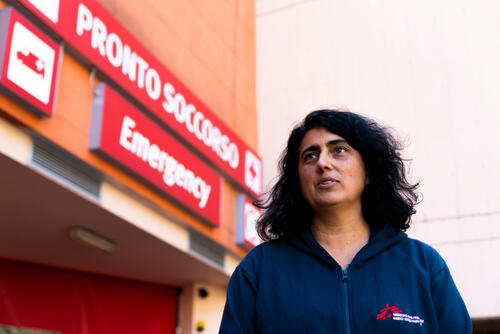- As the number of COVID-19 cases rises in Europe, the current epicentre of the pandemic, frontline healthcare workers face a critical shortage of protective equipment.
- The lack of personal protective equipment leaves healthcare workers exposed to contracting the virus, placing greater strain on the system and pandemic response.
- MSF urges European Union countries to share essential equipment, including masks and gloves, between countries and implement solidarity measures.
Brussels – As the number of people with COVID-19 continues to rise rapidly across many countries in Europe - now the epicentre of the pandemic - Médecins Sans Frontières (MSF) urges European Member States to demonstrate solidarity beyond their national borders. Essential medical supplies, including personal protective equipment starting from face masks to protect healthcare staff, must be urgently channelled to where they are most critically needed.
In Italy, where MSF began working in four hospitals in the country’s epicentre last week, shortages of personal protective equipment are increasingly commonplace, leaving healthcare workers on the frontline exposed. Protective equipment shortages are fuelling the epidemic and hampering the ability to save lives.
Nearly 1,700 healthcare workers, or eight per cent of the total COVID-19 cases in Italy, have been infected with the new coronavirus whilst tirelessly caring for the rising number of severely ill patients who require long-term hospitalisation and specialised intensive care.
1,700
1,7
8
8
Without an influx of urgently needed protective equipment, more healthcare workers will fall ill, reducing the availability of care for patients, generating new clusters of cases.Dr Claudia Lodesani, President of MSF Italy
“Even in high-level European hospitals we see health workers are overwhelmed, coping with up to 80 ambulances per day, with dramatic shortages of protective equipment that puts them at great risk,” says Dr Claudia Lodesani, President of MSF in Italy and lead of the MSF COVID-19 response in the country. “Some doctors are forced to wear the same face mask for 12 hours.”
“Every day we are receiving new calls for help, for more staff, for more supplies,” Dr Lodesani says. “Without an influx of urgently needed protective equipment, more healthcare workers will fall ill, reducing the availability of care for patients, generating new clusters of cases, and dangerously weakening the fight against the disease.”
At this moment of crisis, no country can cope or produce the supplies they need alone. European Member States need to urgently implement the solidarity mechanisms put in place by the European Union. Resources must be shared to fight the pandemic where it is currently raging.
“Today it is Italy that urgently needs supplies of medical equipment to protect healthcare workers, but in a few weeks, it may also be the case elsewhere. Along with increased production, European governments must ensure that supplies can then be shipped easily to the virus hotspots,” says Brice de le Vingne, head of the MSF COVID-19 task force in Brussels. “Meanwhile, threats to close borders risk harming the flow of resources and staff to the most affected areas.”
European governments must ensure that supplies can then be shipped easily to the virus hotspots... this virus respects no borders and solidarity too must be extended beyond them.Brice de le Vingne, head of MSF COVID-19 task force
MSF urges that cooperation should be fostered between states to avoid the stockpiling of supplies. Instead, assistance should be offered across borders to protect healthcare workers who are our collective first line of response against the virus.
“This virus respects no borders and solidarity too must be extended beyond them,” says de le Vingne. “COVID-19 continues to spread, and every country will face the same challenge unless the epicentre of the pandemic is tackled with a strong common effort.”
In addition to reinforcing hospitals and individual patient care, it is paramount to boost the standard public health measures that have proved effective in bringing other infectious disease outbreaks under control. This includes proactive case finding and contact tracing, testing, isolation of patients, isolation of high-risk contacts, mobilisation of the general public to prevent onward transmission, and a strict triage of mild and severe patients in hospitals.
As individuals, members of the public should strictly follow the key hygiene measures and social distancing, to help flatten the curve of the epidemic, avoid overwhelming hospitals, and preserve access to healthcare.
All of this is needed to get the pandemic under control and minimise the loss of life, both of COVID-19 patients but also all other injured and sick patients requiring healthcare.






